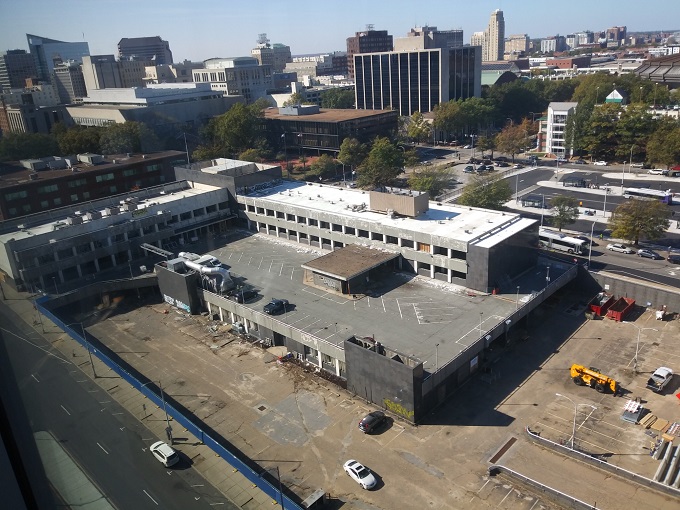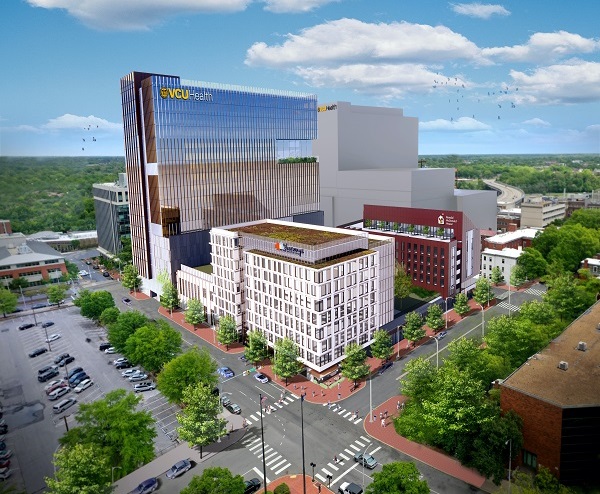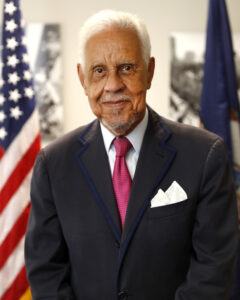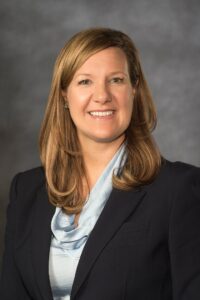The saga surrounding VCU Health’s costly exit from an ill-fated downtown development project continued this week, with Virginia Commonwealth University scrutinizing the results of a public opinion poll conducted by one of its own schools.
The university on Monday released a statement taking issue with the findings and methodology of the latest Commonwealth Poll, conducted by VCU’s L. Douglas Wilder School of Government and Public Affairs, that included questions about the health system’s handling of the so-called Clay Street project – an aborted redevelopment of Richmond’s old Public Safety Building site.
The statewide poll – one of several that the Wilder School conducts annually on a variety of topics – found that 92 percent of respondents familiar with the issue agreed that VCU Health’s Board of Directors “should be responsible for explaining more details about the deal to Virginia taxpayers,” according to a release that accompanied the poll’s findings.
The release includes quotes from school namesake Doug Wilder, the former Virginia governor and a vocal critic of the deal. Referring to reports that the cost of the failed deal to VCU Health could end up exceeding $100 million, Wilder said: “The poll results indicate the need for an official investigation by the state to explain why VCU spent 100 million dollars for nothing. The poll results show that the people have not had any explanation of the waste of taxpayer dollars.”
But VCU’s statement, which was posted on its website and emailed just minutes after the poll results were disseminated, points out that of the 812 adult Virginians surveyed in the poll, only about 100 responded to the VCU Health questions, resulting in what the university called “a questionable sample size” and “results that are skewed.”
The lower number correlates with the 100 or so respondents who, in response to the initial question on the topic, said they were familiar with the issue or didn’t know if they were.
“Additionally, the questions, for some reason, lack full context about the issue, unfortunately preventing respondents from making informed choices,” VCU’s statement said. “Nevertheless, the university did not stand in the way of the Wilder School releasing its poll. However, anyone who reads the poll should closely scrutinize its methodology and conclusions.”
The statement, attributed to the university and no person or body, adds that VCU Health commissioned two third-party reviews that were released to the public, and is “fully cooperating” with a review currently underway by the Joint Legislative Audit & Review Commission (JLARC), a watchdog arm of the Virginia General Assembly. A link to the statement was included in a posting of the poll results on VCU’s website.
“The university is dedicated to supporting academic freedom, even in instances in which it disagrees with content,” the statement said. Later, it describes the failed project as “an anomaly,” reiterating language used by VCU President Michael Rao and other university and health system leadership in comparing the Clay Street project to other successful developments.
In an interview Monday, Wilder said it was VCU’s statement that was an anomaly in the history of the Commonwealth Polls.
“This is the first time this has ever happened, and I’ve been here at VCU for 30 years or more. There’s never, ever been any questioning of the methodology,” Wilder said, noting the polls have been cited by national groups and organizations, including CNN Politics, which endorsed the polls as a presidential election poll, according to the Wilder School’s website.
“It was surprising to me,” Wilder said of VCU’s statement. “It’s regretful that this has come to this.”
Wilder has been a vocal critic of VCU’s handling of the project, a $325 million high-rise office complex that would have replaced the old Public Safety Building at 500 N. 10th St. Called the Clay Street project for its planned reconnection of Clay Street through the site, the project died early last year after VCU Health pulled out as the building’s master tenant.
When Freedom of Information Act requests from Richmond BizSense revealed that the exit required a $73 million payment from VCU Health, Wilder called a press conference at the Capitol building in which he called for a state investigation and for VCU’s Board of Visitors to fire Rao.
Asked Monday if his outspokenness about the project could skew public perceptions about the poll, Wilder dismissed the notion.
“People know I’m associated with VCU,” he said. “I have nothing to hide. I have nothing to gain.”
In the statewide poll, which also included questions about Gov. Glenn Youngkin’s and President Joe Biden’s job performance and about the upcoming presidential election, the first question about VCU Health asked respondents if they were familiar with “the reports released” about the development deal, to which only 7 percent, or 65 respondents, said that they were, and 4 percent, or 41 respondents, said they didn’t know.
Those numbers appear to have informed the following questions’ results, with roughly 100 respondents or fewer answering whether they “strongly” or “somewhat” agreed or disagreed with the questions, some of which refer to reporting by BizSense of such details as a $100 million difference between the project’s budget and the financing secured for it by the project’s development group.

Site prep for demolition of the Public Safety Building has ramped up in recent months. (BizSense file photo)
Of 99 respondents to the question, 91 of them, or 92 percent, agreed that the health system board “should be responsible for explaining more details about the development deal to Virginia taxpayers, including why the development deal was not completed and why $100 million more was secured for financing than was quoted for the cost of the project.”
Other questions asked if respondents agreed or disagreed that Gov. Youngkin “has had the state appropriately investigate” the deal; that correspondence between VCU and VCU Health leadership “indicate there has been information about the deal that has been concealed or kept from the public”; and if “there was a cover up” when then-VCU Health CEO Art Kellermann “was forced to sign the contract, then subsequently fired.”
The poll was conducted from Dec. 28 to Jan. 13 via phone survey.
On Tuesday, the Wilder School issued a response to VCU’s statement, with the headline: “VCU administration negates Virginians’ voices, maligns Wilder School Commonwealth Poll credibility in conflict of interest over failed VCU Health development deal.” It was posted on the Wilder School’s website but was denied distribution by VCU, a school spokesman said.
Calling VCU’s statement “damaging and factually incorrect,” the Wilder School’s Tuesday response described its Commonwealth Polls as “a tested bellwether of public opinion” for 15 years and that at no point has the poll’s methodology changed or been challenged.
It adds that VCU “has never refuted” the polls “nor challenged the quality of its content.” It also alleges that VCU delayed the distribution of this latest poll by two days “in order to craft” the statement that went out minutes after the poll was disseminated Monday. A timestamp on the Wilder School’s website shows the results were initially posted on the site Friday.
Robyn McDougle, associate dean of research and outreach at the Wilder School, said topics and questions included in a Commonwealth Poll are submitted by faculty and considered based on a variety of things, such as discussion in the community, notable Supreme Court rulings, and topics of interest in an election year or General Assembly session.
“When we select the questions for our winter poll, we do select questions that are pressing issues and/or policy questions that would be relevant while the General Assembly is in session,” McDougle said Monday.
She said the school conducts three to five polls per year, and topics and questions are determined by a group consisting of herself, Dean Susan Gooden, and Wilder.
Wilder said his involvement in selecting poll questions has no bearing on a poll’s results or validity. He said the VCU Health questions are warranted in light of what he maintains has been a lack of response from VCU and state leadership.
“When you are in the state capital, and when you’re having perhaps as much as $100 million being unaccounted for…and absolutely no explanation from the president, no explanation from the Board of Visitors, the next question would be: Do the people of Virginia expect answers? Do the people of Virginia look for explanations?” Wilder said.
In its statement on Monday, VCU said it stands by its response to the Clay Street project and maintained that it has been transparent with the public.
“In reality, VCU Health has broadly shared the circumstances, facts and outcomes about the Clay Street project, including the two independent, external reviews it commissioned,” the statement said, referring to the Saul Ewing report of the project’s beginnings and end, and to the Chartis Group review that included recommendations for governance best practices.
“Both reviews were made public. Further, VCU Health is fully cooperating with the General Assembly’s (JLARC) review of VCU Health. We look forward to its report,” the statement said. Later, it adds: “As it voted unanimously to begin the Clay Street project, the VCU Health Board of Directors voted unanimously to end the project. Exiting the project meant avoiding far greater financial problems in the future.”
The saga surrounding VCU Health’s costly exit from an ill-fated downtown development project continued this week, with Virginia Commonwealth University scrutinizing the results of a public opinion poll conducted by one of its own schools.
The university on Monday released a statement taking issue with the findings and methodology of the latest Commonwealth Poll, conducted by VCU’s L. Douglas Wilder School of Government and Public Affairs, that included questions about the health system’s handling of the so-called Clay Street project – an aborted redevelopment of Richmond’s old Public Safety Building site.
The statewide poll – one of several that the Wilder School conducts annually on a variety of topics – found that 92 percent of respondents familiar with the issue agreed that VCU Health’s Board of Directors “should be responsible for explaining more details about the deal to Virginia taxpayers,” according to a release that accompanied the poll’s findings.
The release includes quotes from school namesake Doug Wilder, the former Virginia governor and a vocal critic of the deal. Referring to reports that the cost of the failed deal to VCU Health could end up exceeding $100 million, Wilder said: “The poll results indicate the need for an official investigation by the state to explain why VCU spent 100 million dollars for nothing. The poll results show that the people have not had any explanation of the waste of taxpayer dollars.”
But VCU’s statement, which was posted on its website and emailed just minutes after the poll results were disseminated, points out that of the 812 adult Virginians surveyed in the poll, only about 100 responded to the VCU Health questions, resulting in what the university called “a questionable sample size” and “results that are skewed.”
The lower number correlates with the 100 or so respondents who, in response to the initial question on the topic, said they were familiar with the issue or didn’t know if they were.
“Additionally, the questions, for some reason, lack full context about the issue, unfortunately preventing respondents from making informed choices,” VCU’s statement said. “Nevertheless, the university did not stand in the way of the Wilder School releasing its poll. However, anyone who reads the poll should closely scrutinize its methodology and conclusions.”
The statement, attributed to the university and no person or body, adds that VCU Health commissioned two third-party reviews that were released to the public, and is “fully cooperating” with a review currently underway by the Joint Legislative Audit & Review Commission (JLARC), a watchdog arm of the Virginia General Assembly. A link to the statement was included in a posting of the poll results on VCU’s website.
“The university is dedicated to supporting academic freedom, even in instances in which it disagrees with content,” the statement said. Later, it describes the failed project as “an anomaly,” reiterating language used by VCU President Michael Rao and other university and health system leadership in comparing the Clay Street project to other successful developments.
In an interview Monday, Wilder said it was VCU’s statement that was an anomaly in the history of the Commonwealth Polls.
“This is the first time this has ever happened, and I’ve been here at VCU for 30 years or more. There’s never, ever been any questioning of the methodology,” Wilder said, noting the polls have been cited by national groups and organizations, including CNN Politics, which endorsed the polls as a presidential election poll, according to the Wilder School’s website.
“It was surprising to me,” Wilder said of VCU’s statement. “It’s regretful that this has come to this.”
Wilder has been a vocal critic of VCU’s handling of the project, a $325 million high-rise office complex that would have replaced the old Public Safety Building at 500 N. 10th St. Called the Clay Street project for its planned reconnection of Clay Street through the site, the project died early last year after VCU Health pulled out as the building’s master tenant.
When Freedom of Information Act requests from Richmond BizSense revealed that the exit required a $73 million payment from VCU Health, Wilder called a press conference at the Capitol building in which he called for a state investigation and for VCU’s Board of Visitors to fire Rao.
Asked Monday if his outspokenness about the project could skew public perceptions about the poll, Wilder dismissed the notion.
“People know I’m associated with VCU,” he said. “I have nothing to hide. I have nothing to gain.”
In the statewide poll, which also included questions about Gov. Glenn Youngkin’s and President Joe Biden’s job performance and about the upcoming presidential election, the first question about VCU Health asked respondents if they were familiar with “the reports released” about the development deal, to which only 7 percent, or 65 respondents, said that they were, and 4 percent, or 41 respondents, said they didn’t know.
Those numbers appear to have informed the following questions’ results, with roughly 100 respondents or fewer answering whether they “strongly” or “somewhat” agreed or disagreed with the questions, some of which refer to reporting by BizSense of such details as a $100 million difference between the project’s budget and the financing secured for it by the project’s development group.

Site prep for demolition of the Public Safety Building has ramped up in recent months. (BizSense file photo)
Of 99 respondents to the question, 91 of them, or 92 percent, agreed that the health system board “should be responsible for explaining more details about the development deal to Virginia taxpayers, including why the development deal was not completed and why $100 million more was secured for financing than was quoted for the cost of the project.”
Other questions asked if respondents agreed or disagreed that Gov. Youngkin “has had the state appropriately investigate” the deal; that correspondence between VCU and VCU Health leadership “indicate there has been information about the deal that has been concealed or kept from the public”; and if “there was a cover up” when then-VCU Health CEO Art Kellermann “was forced to sign the contract, then subsequently fired.”
The poll was conducted from Dec. 28 to Jan. 13 via phone survey.
On Tuesday, the Wilder School issued a response to VCU’s statement, with the headline: “VCU administration negates Virginians’ voices, maligns Wilder School Commonwealth Poll credibility in conflict of interest over failed VCU Health development deal.” It was posted on the Wilder School’s website but was denied distribution by VCU, a school spokesman said.
Calling VCU’s statement “damaging and factually incorrect,” the Wilder School’s Tuesday response described its Commonwealth Polls as “a tested bellwether of public opinion” for 15 years and that at no point has the poll’s methodology changed or been challenged.
It adds that VCU “has never refuted” the polls “nor challenged the quality of its content.” It also alleges that VCU delayed the distribution of this latest poll by two days “in order to craft” the statement that went out minutes after the poll was disseminated Monday. A timestamp on the Wilder School’s website shows the results were initially posted on the site Friday.
Robyn McDougle, associate dean of research and outreach at the Wilder School, said topics and questions included in a Commonwealth Poll are submitted by faculty and considered based on a variety of things, such as discussion in the community, notable Supreme Court rulings, and topics of interest in an election year or General Assembly session.
“When we select the questions for our winter poll, we do select questions that are pressing issues and/or policy questions that would be relevant while the General Assembly is in session,” McDougle said Monday.
She said the school conducts three to five polls per year, and topics and questions are determined by a group consisting of herself, Dean Susan Gooden, and Wilder.
Wilder said his involvement in selecting poll questions has no bearing on a poll’s results or validity. He said the VCU Health questions are warranted in light of what he maintains has been a lack of response from VCU and state leadership.
“When you are in the state capital, and when you’re having perhaps as much as $100 million being unaccounted for…and absolutely no explanation from the president, no explanation from the Board of Visitors, the next question would be: Do the people of Virginia expect answers? Do the people of Virginia look for explanations?” Wilder said.
In its statement on Monday, VCU said it stands by its response to the Clay Street project and maintained that it has been transparent with the public.
“In reality, VCU Health has broadly shared the circumstances, facts and outcomes about the Clay Street project, including the two independent, external reviews it commissioned,” the statement said, referring to the Saul Ewing report of the project’s beginnings and end, and to the Chartis Group review that included recommendations for governance best practices.
“Both reviews were made public. Further, VCU Health is fully cooperating with the General Assembly’s (JLARC) review of VCU Health. We look forward to its report,” the statement said. Later, it adds: “As it voted unanimously to begin the Clay Street project, the VCU Health Board of Directors voted unanimously to end the project. Exiting the project meant avoiding far greater financial problems in the future.”






It is too bad that sample size for the question was so small but I have a feeling if you found 800 people with knowledge of the project and responded (and had read those internal emails about the project process) you probably find similar percentages in your results that has been conducted. VCU leadership needs to take its crow and be quiet.
In this case both size and details matter. Wilder loves attention and lives by the credo that one is either known or the opposite, unknown. This is just another of his “look at me” opportunities using a public poll for a matter that is incredibly complex. Personally, I’d like to see further investigation because something seems amiss here, besides $100 million. But a public poll with so little results is not the way to do it.
Looking forward to the release of JLARC’s report. Are JLARC’s recommendations enforceable? Will anyone be fired? I doubt it and VCU will pay the 73 million or more.
Has there ever been a worse marriage than Wilder & VCU. He’s seemingly tried to undercut, criticize and damage their brand since he stepped on campus and started accepting their paycheck.
Isn’t it a worse look for VCU to criticize the methodology that one of their own departments used to conduct a poll while trying to defend the university at large’s reputation?
or what they are really saying is if this was anyone but Wilder they would have shelved it. I see this as a calculation of what they see as their only way not to just stand their and take his slings and arrows without punching back.
A Hedge fund stole $100ms from Virginia and Wilder didn’t use the right methodology in asking people what they thought of it? This development deal is one of the biggest scams in history if there were any justice the people responsible for this would all be thrown in jail. Thank g d Wilder said something because no one else did.